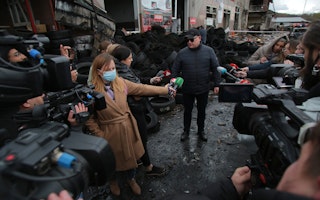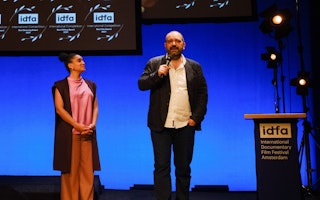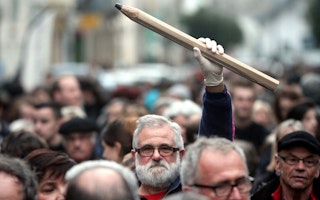Advocating for Media Freedom in Azerbaijan
By Ed Pittman & Rebecca Vincent
Some know Azerbaijan as an oil-rich former Soviet Republic that holds enormous geopolitical and economic importance for the U.S. and the European Union. Others know it as the winner of the 2011 Eurovision song contest. Still others might not have heard of it at all. But for human rights defenders and freedom of expression advocates, the country came into the spotlight on May 26, when Azerbaijani editor Eynulla Fatullayev was released from prison following his pardon by presidential decree.
Fatullayev had spent more than four years wrongfully imprisoned on a series of politically motivated charges connected to his professional journalistic activities, including defamation, supporting terrorism, inciting ethnic hatred, tax evasion, and drug possession. The numerous calls for his release from international organizations and tireless legal challenges to his convictions by local groups initially appeared to fall on deaf ears.
In addition to serving jail time, Fatullayev and his family had faced years of intimidation and harassment aimed at silencing his critical voice. He is far from alone in having suffered such persecution in a country where an independent and free media still seems a distant prospect and journalists and bloggers are under constant threat of imprisonment and even physical attacks.
For some, Fatullayev’s release was a shock move by a government which had seemed intent on keeping him in prison at all costs. For the International Partnership Group for Azerbaijan (IPGA), however, his release was far from spontaneous; it was the long-awaited result of intensive strategic advocacy work.
Achieving Fatullayev’s release was one of the IPGA’s top priorities since its inception, as many of its member organizations had been working individually on his case since his initial arrest following his conviction for defamation in April 2007. When the Azerbaijani authorities ignored the European Court of Human Rights ruling calling for Fatullayev’s release in April 2010 and kept him imprisoned instead on fabricated charges of drug possession, it became clear that more concerted advocacy efforts were needed.
In light of the exceptional nature of the decision by the European Court of Human Rights in Fatullayev’s case—only the second of its kind—the IPGA focused intensely on advocating for his release within the Council of Europe. IPGA delegations travelled to Strasbourg in connection with the Committee of Ministers’ debates on the case in November/December 2010 and March 2011, as well as the Parliamentary Assembly of the Council of Europe session in April 2011, raising the group’s concerns and pressing for these bodies to take action. The IPGA’s efforts resulted in two strong decisions by the Committee of Ministers and increased pressure on the Azerbaijani government to comply with its freedom of expression obligations.
In addition to its advocacy at the Council of Europe, the IPGA highlighted Fatullayev’s case in a report following its September 2010 freedom of expression mission to Azerbaijan and openly called for President Aliyev to release Fatullayev from prison. The IPGA’s joint efforts culminated in parallel demonstrations staged in front of the Azerbaijani embassies in London and Paris in April 2011, calling for Fatullayev’s release. The demonstrations received widespread media coverage, which further increased the international pressure on the Azerbaijani authorities to release him. They did so just over a month later.
Although Fatullayev’s release was a notable achievement, the IPGA has much work remaining. As in the cases of many other journalists and bloggers who have served wrongful prison sentences in Azerbaijan, justice has not been rendered in Fatullayev’s case. The authorities have not transferred to Fatullayev payment of just satisfaction as ordered by the ECtHR . He remains burdened with an unmerited criminal record and faces significant challenges in his efforts to return to work as one of Azerbaijan’s few independent editors.
Further, several other problems continue to contribute to the overall worsening freedom of expression climate in the country. A number of bloggers and youth activists remain imprisoned for calling for pro-democracy protests, and non-governmental organizations working on democracy and human rights issues are facing increasing pressure from the authorities. An alarming cycle of violence against journalists and impunity for their attackers continues, and defamation remains a criminal offense, leaving journalists vulnerable and resulting in widespread self-censorship.
The IPGA is a coalition of 20 international organizations, led by ARTICLE 19 and supported by the Open Society Foundations, which came together in 2010 to join their efforts to promote and protect freedom of expression and media development in Azerbaijan. It works in parallel with local freedom of expression and civil society groups through a membership which spans the U.S. and Europe and includes organizations which focus on freedom of expression advocacy, media development, and broader human rights.
The IPGA comes out of a model developed by International Media Support and the Open Society Foundations to foster effective collaboration on issues of media development, freedom of expression and emergency interventions by international freedom of expression groups. It has had notable successes in Zimbabwe, Uganda, and Belarus to name but a few. In all such interventions, participation by local civil society and freedom of expression groups are seen as key, and with dedicated groups of lawyers and activists pushing for Fatullayev’s release in Baku, the IPGA’s success in this case was no exception.
Until January 2023, Edward Pittman was a senior program manager of Expression at the Open Society Foundations.
Rebecca Vincent is a freelance human rights consultant and expert on freedom of expression in Azerbaijan, who coordinated the International Partnership Group for Azerbaijan for ARTICLE 19.


